

Discover more from Liberating Motherhood
You're not a good dad if you don't do these things
You can't be a good father if you mistreat your children's mother.
It’s the cardinal rule of parenting, and sooner or later everyone learns it: If you’re a mom, nothing you do will ever be right. The way you give birth is wrong and inadequate. You’re feeding your kids wrong. You’re simultaneously being too loving and not loving enough. You’re too strict. You’re too permissive. You don’t show up perfectly for every single thing, always, forever, and do extra each time. You. Are. Inadequate.
Motherhood and fatherhood are dramatically different experiences. Motherhood is mired in guilt, shame, and inadequacy. Fatherhood is all about the participation trophy. Show up and get applause—even if a woman dressed the kids, fed the kids, and did all the planning for you to show up and get the applause.
There will always be someone there to remind you that as a mother, you can never get it right—the teacher judging you for your child’s separation anxiety; the stranger judging you for the temper tantrum that you so expertly handled; the randos who object to what your kid eats, wears, does. The endless advice from people who think you’re too stupid to ever pause and think about what you do and how you do it.
But dads? Dads show up at Target with a child for 20 minutes and don’t accidentally murder their children.
“What a great dad!”
What a fucking terrible culture.
We see it all the time in mom groups, too.
A woman will post a long list of the bullshit her husband has subjected her to. He leaves her with the kids all weekend so he can golf. He doesn’t do his fair share around the house. She works, too, but still does 90% of the housework. He didn’t make her a single meal when she was postpartum, or pressured her to lose weight, or said giving birth was gross, or did hundreds of other things that are objectively abusive, but which our culture accepts as the price of involvement with men.
And then she’ll end her post with: “But he’s actually a really good dad!”
No the fuck he is not. A lot of mothers, a lot of children, a lot of families would be a lot better off if we stopped with this cultural fantasy. If we accepted that when a father sucks at fatherhood, we need to admit it—not praise him in the hopes that maybe he’ll do better, because he fucking won’t.
Most dads are not good dads, or even adequate dads, because our culture places almost no demands on fathers, and because fathers feel almost no pressure to try. We occupy a bizarre reality in which a woman can sacrifice her entire life at the altar of motherhood, commit herself to doing everything perfectly, and still routinely hear that she is a bad mother. A father can do literally nothing at all, and still constantly hear about what a great father he is.
So what do actually good fathers do? What standards should we hold men to? At minimum, here’s what a man must do to be a good father.
Good fathers respect their children’s other parent
Children love their parents. And with rare exceptions for truly abusive parents, children identify with their parents—as they should.
When a father demeans his child’s other parent, he demeans his child. He forces his child to divide their loyalties, to pretend not to love the person they love most, in an effort to gain or retain the love of their father.
This is inherently abusive.
Fathers do not have to love their child’s other parent, or even like them. Relationships sometimes fail. But they must respect their co-parent, and model this respect.
Fathers who actively undermine their co-parent, who speak negatively about their co-parent, who abuse their co-parent, are not good fathers.
Oh, and btw, outsourcing all of the parenting heavy lifting, housework, and emotional labor to your co-parent is abusive. Buying your time with someone else’s exhaustion is stealing their life. Good fathers don’t steal the lives and time of their co-parents.
Children deserve to grow up in families where they feel safe loving all of their adults, and where they know that all of their adults are working together toward a shared goal, not actively undermining one another.
Good fathers educate themselves about parenting
There are lots of ways to be a good parent. There are also lots of ways to be a bad parent. And so yes, there actually are parenting manuals—many of them. They tell us that yelling and spanking and shame and threats don’t work. Yet too many men parent by intuition alone, based on what makes them feel good.
We all pick up negative habits from our parents, from our culture, from our own shortcomings. The things that feel best to us are often the worst for our children. Let’s be real: It feels good in the moment to yell at a child whose emotional needs frustrate us. But it’s terrible for them.
Most women spend endless hours of their lives posting on parenting forums and reading books and scouring through scientific studies. Most men, for some reason, feel no obligation to educate themselves about parenting.
Good fathers feel that obligation, and they learn all they can.
Good fathers also do not undermine the educated parenting efforts of their partners.
Good fathers do more than play and discipline
Lots of people play with my kids. And yelling at a wayward child is something even a stranger can do.
The real work of parenting is in the lonely, solitary, unfulfilling daily grind. It’s in remembering homework each and every day, getting up a dozen times with a baby, or a sick child, or a sad teenager, in advocating for a child at school and in the world, in the millions of mundane tasks that mothers do, and for which mothers never garner praise (and often find only scorn).
The real, deep intimacy of parenting is found in the work. Children know and see who does that work. To be a good father, you have to be an equal participant in the daily slog of parenting.
You have to do your kids’ hair, and know how to feed them, and plan playdates, and think about and enroll them in activities, and clean out their backpacks, and care for their pets, and buy seasonally appropriate clothes, and establish a routine, and help them in the night. You have to do all the things mothers do without thinking.
Good fathers consistently show up, and treat fatherhood as a job—not a hobby or an option
Mothers almost never abandon their children. And most mothers feel guilty if they miss even an occasional event, or periodically forget to send that thing they were supposed to send to school. Mothers operate according to a profound sense of duty.
For fathers, it’s all optional. Because when a kid shows up at school without their folder, or in the wrong clothes, or throwing a temper tantrum, we blame mom. Never dad. Fatherhood is always optional in a patriarchal society, while the burdens of motherhood are inescapable.
Good fathers never treat the work of parenting as optional. They show up day after day, doing the dirty behind the scenes work—both because they know their kids deserve it, and because they understand that outsourcing it all to mom robs mom of her life, her hobbies, her time, and her well-being.
Good fathers share the load
Men are not stupid.
Good fathers don’t act like they are. They know that kids need food. They know that the house needs to be clean, that someone must buy groceries and pay the bills and email the teachers.
There is meaning to be found in immersing oneself in these daily tasks. And more importantly, fathers who don’t do this work force mothers to do it, thereby stealing significant chunks of mothers’ lives.
Good fathers don’t mistreat their children’s mothers.
It doesn’t matter if he works and she doesn’t, or if he earns more.
Both partners’ time is equally valid. So if he gets to relax after work and on the weekends, and she never gets a break from the endless slog of parenting, he’s a shitty-ass father (and husband).
Good fathers show gratitude
If you give birth to your children, as most mothers do, there’s a hard biological reality: Motherhood demands more, physically, from mothers than from fathers. There’s nine months of pregnancy. Childbirth. Breastfeeding. Giving birth in a birthing system that is getting progressively more dangerous and abusive. Most mothers put their lives and bodies on the line in a way that fathers never do.
Good fathers recognize this. They show gratitude for their partner’s sacrifice. And they try to find ways to balance things out. If mom is up breastfeeding with a baby who won’t take a bottle, then they take over cleaning, or make sure mom can nap during the day.
Bad fathers mock and demean childbirth. They minimize the effort involved. They demand weight loss. They use their partner’s efforts as an excuse. “Well, you’re breastfeeding so I guess I can’t do anything else!”
Parenting is challenging work.
It requires immense emotional intelligence and commitment to do well. Women almost never get credit for these attributes, even when they do it all on their own in difficult circumstances. If more fathers start doing the work, perhaps then we’ll finally be willing to acknowledge how challenging parenting is. And the more fathers step up, the less overwhelmed and despondent mothers will feel.
It’s time we start judging dads by the same standards we apply to mothers.
If you think I missed something on this list, please add your own thoughts in the comments!
Updates for subscribers
This is the part where I ask you to become a paid subscriber, if you can afford to do so. Almost all of my work is free, because I want it to be accessible. I’m doing this to change the culture, not to get rich. But my time on feminist writing is time spent away from my paid writing work. And I would like to make my feminist writing a more integral part of my paid writing work, so I can do more of it.
That means I’m offering a number of benefits to paid subscribers. I hope that, if you can afford to do so, you’ll consider supporting my work so that I can do more of it, and do it better.
Here are the benefits you get if you subscribe:
Additional paid content. Right now, I’m publishing a twice-monthly column on the weapons men use to escape accountability. I’m also going to start releasing more personal posts occasionally, about my marriage, kids, life, and generally building more feminist relationships.
Early releases. I release survey results and certain content early to paid subscribers. Later this month, I will be doing a new survey on sexual relationships in marriage. Paid subscribers will get early access to the data.
A paid, private support group. This means no trolls and no anti-feminist bullshit. I also post surveys and solicit feedback on my content from the group. If you’re already a subscriber, find it here.
If you truly cannot afford to subscribe but would like to get access to the support group, please email zawn.villines@gmail.com. You don’t need to tell me why you can’t afford it; I’m using an honor system, and trusting my readers.
Anyway, I hope you’ll consider subscribing. And if you can’t subscribe, you can support my work by sharing it, commenting on it, or liking it on Facebook or here.
















Mothers operate according to a profound sense of duty. This is so poignant and how I often describe my feelings toward motherhood. Thank you for all you do Zawn
I'll never forget the one time I tried to outsource help -- a house cleaning service -- and the boss said it would cost more/take longer because of how much there was to do. I said I understood, that I'd been juggling my father's last days in the hospital and death over the last month on top of my taking care of my 3 kids (2 special needs, one a baby). She pressed that they wouldn't actually have time to complete the service, and I expressed stress and she said, "Listen, I don't mean to mom shame, but..." My husband was working from home. He was literally home AS they were cleaning. Yet it fell onto me.